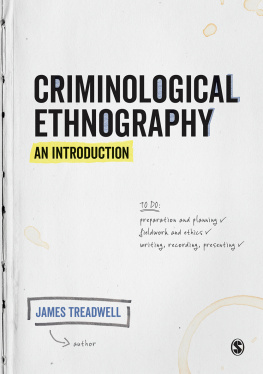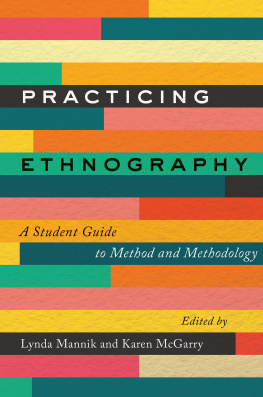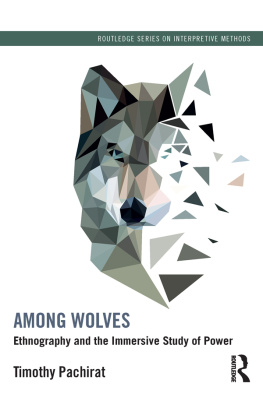ETHNOGRAPHY LESSONS
A PRIMER
Harry F. Wolcott
First published 2010 by Left Coast Press, Inc.
Published 2016 by Routledge
2 Park Square, Milton Park, Abingdon, Oxon OX14 4RN
711 Third Avenue, New York, NY 10017, USA
Routledge is an imprint of the Taylor & Francis Group, an informa business
Copyright 2010 Taylor & Francis
All rights reserved. No part of this book may be reprinted or reproduced or utilised in any form or by any electronic, mechanical, or other means, now known or hereafter invented, including photocopying and recording, or in any information storage or retrieval system, without permission in writing from the publishers.
Notice:
Product or corporate names may be trademarks or registered trademarks, and are used only for identification and explanation without intent to infringe.
Library of Congress Cataloging-in-Publication Data
Wolcott, Harry F., 1929
Ethnography lessons : a primer / Harry F. Wolcott.
p. cm.
Includes bibliographical references and index.
ISBN 978-1-59874-580-1 (hardcover : alk. paper) ISBN 978-1-59874-581-8 (pbk. : alk. paper)
1. EthnologyFieldwork. 2. EthnologyAuthorship.
3. EthnologyQualitative research. I. Title.
GN346.W66 2010
301dc22
2010030798
ISBN 978-1-59874-580-1 hardcover
ISBN 978-1-59874-581-8 paperback
A primer (primer), I am informed by my trusty dictionary (American Heritage, fourth edition) is, among other things, a book that covers the basic elements of a subject, not to be confused with primer, an undercoat of paint or size applied to prepare a surface, as for painting. This is a primer intended to cover some of the basic elements of ethnography. It does not provide an undercoat intended to cover all the basic elementsthere are other books for doing that. They do it quite well. (I immodestly include Ethnography: A Way of Seeing among them, but it is a way of seeing, not the way.)
No, this book is intended for those who have become serious about ethnography and would like to know just a bit more before actually engaging in it. And since you cant yet share your experiences with ethnography, I have set out here to share mine. Old-timers among ethnographers will no doubt agree with some of the points I make and will disagree with others, but they have to accept that this is the actual course of events and the evolution of my studies and that these are the lessons I have gleaned from them. I have not assumed, however, that you necessarily are familiar with any of my written accounts, and I have tried to say enough about each of them as they are introduced so that you understand what prompted the lesson.
As an ethnographer, I look back on these forty plus years with satisfaction, although my experience with ethnography no doubt fails to put me among a class of swashbuckling adventurers. I guess you could place me among most academics whose adventures are generally of a sort that must be judged by the depth of their studies rather than the danger of their missions.
I have constructed the text around my five major studies, all of which have been reported in published texts, beginning with my dissertation study among the Kwakiutl Indians of British Columbia and ending (almost literally) with a book called Sneaky Kid and Its Aftermath. With all five texts in place it has been easy for me now to move among them, and it may surprise you to find that I begin with a key lesson from my second study, The Man in the Principals Office: An Ethnography. The reason for that, as you are about to learn, is that is where these lessons actually began to sink in.
What follows from there is a discussion of some critical components of ethnography often mentioned but seldom written about: the subjects of serendipity and personal ethics, for example. I also want to share with you the results of my career-long search for the essence of ethnography. So on the one hand, the book promises to tell you a lot about ethnography without guaranteeing that you will learn anything new except about how I went about it, and on the other hand, if it is all new to you, I hope you will find the lessons sufficiently informative that you will want to learn more about ethnography before, or as, you try it for yourself.
For myself, in a lifetime of ethnography, I could not have found a pleasanter way to live a productive life and feel the satisfaction of doing something worthwhile. And I found that I always had something to write about. I hope you find or have already found your own satisfaction in beginning to pursue ethnography.
And now, let the lessons begin
CHAPTER ONE
Ethnography Lesson
The chapter that I am about to deconstruct was originally written in the period 19681972, so its story is hardly newsworthy. In its final version this chapter originally appeared in 1974 and proved to be a great success. It remained in print for years. I have taken this opportunity to share the lessons I learned with other beginning ethnographers. I have written about this material before (Wolcott 2003c), but in that writing I erroneously laid my problem to a problem with writing, rather than to my lack of understanding about ethnography.
What seems most curious is how I happened to save the earliest draft of that original chapter and the subsequent critiques to it that I received. My file drawers have always bulged, a particular problem for any professor who remains at the same institution for so long. Of course, my office moved from place to place and building to building as education experienced its incessant but cosmetic changes. However, the moves were never so dramatic that I needed virtually to chuck everything in order to make the shift. At one time my small office contained five file cabinets full of precious (to me) documents. Still, I was constantly throwing out old material. I suspect that I kept this set of comments with the intention to write more about it someday. Now, more than forty years later, I am able to fess up.
The story has multiple strands, but it all began with meeting George Spindler, professor of education and anthropology at Stanford University, in 1960 when I embarked on a course of doctoral studies. I was unaware that such a program existed until I met Spindler. I realized that a program combining anthropology and education was the kind of program that interested me, even if, as I suspected at the time, it didnt necessarily lead anywhere or at least to a position that anyone was trying to fill. Those of us who elected to study with Spindler were simply willing to take our chances, perhaps hoping later to apply for a position probably in some department of social foundations of education.













